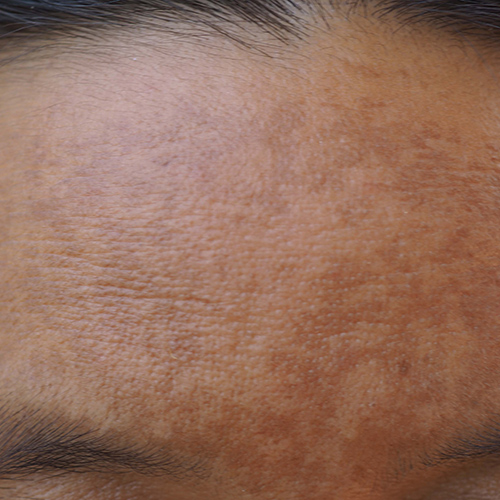Melasma is a specific type of hyperpigmentation caused by hormones, often presenting on the cheeks, forehead, and upper lip. Melasma can be stubborn to treat, but with the right approach with our SKIN team, the condition can be taken care of and quality of life improved. Our Laser Melasma Treatment targets and breaks down the existing pigmentation for a clearer looking complexion.
Get The Facts
Melasma is a complex type of hyperpigmentation to treat. It requires special care and knowledge of lasers and products to inhibit pigment production in the skin. Melasma can be stimulated by heat, therefore precise laser modalities and settings are chosen by your technician, curating the procedure for you and your skin. It is important that throughout your consultation, you have a clear understanding that melasma may only be improved temporarily.
With the combination of medical-grade skincare and laser treatments, we can help suppress the melasma, leaving you with glowing results.

Before You Arrive:
+ Please ensure you have filled out your Health History/Intake form before your appointment. If you are unable to complete it, please arrive 15 minutes early
+ We recommend eating a light snack or meal 30min-1hr before your appointment
+ Remove makeup before the appointment
+ Ensure you wear medical grade SPF 50 in the treatment area 4-6 weeks prior
+ Wear loose comfortable clothing to your appointment
+ Ensure you have showered prior as you won’t be able to wash your hair for a couple days
+ Ensure all facial hair is shaved before the appointment
How to Prepare:
+ You will be provided a prescription after your consultation for Valtrex This medication will help prevent certain side effects. Please pick it up at a pharmacy of your choice before your appointment
+ Please start taking your Valtrex 2 days before your appointment
+ You can take Tylenol before your appointment to help with the pain
What To Avoid:
Please avoid the following:
+ Alcohol & smoking 24hours prior
+ Caffeine on the day of treatment
+ Aspirin or other non-steroidal anti-inflammatory drugs such as Ibuprofen, Advil®, Motrin®, Aleve®, Fish oil, Gingko Biloba, St. John’s Wort, and high doses of vitamin E, unless medically necessary
+ Neuromodulators for at least 2 weeks prior
+ Filler for at least 4 weeks prior
+ Sun exposure 4- 6 weeks prior
+ Tanning including spray tan and self-tanning products 4-6 weeks prior (if you have a tan at the time of your appointment it will have to be rescheduled for safety reasons)
+ Retinol or active exfoliants for 5-7 days prior
+ Must be off of oral isotretinoin (Accutane) for a minimum 6 months prior
+ Is it our policy not to provide treatment if you are pregnant or breastfeeding
Downtime:
+ 5 days, this is true downtime and you must remain indoors until your skin is healed
+ Pinpoint bleeding normal for first 24 hours
+ Redness, swelling, and tenderness are to be expected for a couple days
+ Dryness and sloughing will develop as healing progresses
+ Pigment will get darker before it gets lighter
Post Care:
+ Vinegar soaks and gentle cleanser can be used on day 1 post-treatment
+ Apply a thin layer of Aquaphor after cleansing
+ Vinegar soaks can be done throughout the day, up to 5 times per day
+ Only cleanse with gentle cleanser morning and night
+ Aquaphor can be applied as needed to keep skin moist
+ You can start applying a gentle moisturizer (of your practitioner’s choosing) on day 4
+ Continue to take your Valtrex until the course is completed.
+ Can take antihistamines to control swelling
+ Keep the area clean and keep hair tied up
What to avoid:
+ Sun exposure for 1 week
+ Hot tubs, baths, saunas, and steam rooms for 1 week
+ Strenuous for exercise for 1 week
+ Makeup, lotions, and active skin care for 1 week
+ Cannot shave treated area for 2 weeks post
Follow Up:
+ Contact us immediately if you have any blister, cold sore, or pustule formation in the treated area
+ We recommend 1-2 treatments for optimal results
+ Maintenance treatments every 6 months-1 year
+ Reduction in the pigmentation
+ smoother looking complexation
+ regain confidence
+ Melasma
+ Pigmentation
Although both may appear as darkening in the skin, melasma is different from other forms of hyperpigmentation simply by what causes it; rather than just being sun-related, melasma is caused by hormonal changes within the body.
No. Melasma is a hormonal condition that can reoccur. We can improve the overall appearance and reduce the reoccurrence with regular laser treatments and medical-grade skin care.
Consistent use of medical-grade skincare focused on targeting stubborn pigmentation and preventing future pigmentation. Following your pre and post-care instructions diligently. Most importantly, wearing/reapplying SPF daily will help protect your results.
Melasma laser treatment is typically suitable for individuals with melasma who have not responded to other treatments or who prefer a more targeted approach. However, it is important to consult with a dermatologist or skincare professional to determine if you are a suitable candidate for this procedure, as individual factors can influence treatment options.
Melasma can potentially return after laser treatment, especially if underlying triggers such as hormonal changes or sun exposure persist. To minimize the chances of melasma recurrence, it’s important to follow a comprehensive skincare routine, wear broad-spectrum sunscreen, and take preventive measures recommended by your dermatologist.
Melasma laser treatment can cause some discomfort, but it is generally well-tolerated. The sensation is often described as a series of tiny rubber band snaps on the skin. Topical anesthetic creams can be applied before the procedure to minimize any potential discomfort.
With
Follow our socials to stay up-to-date.